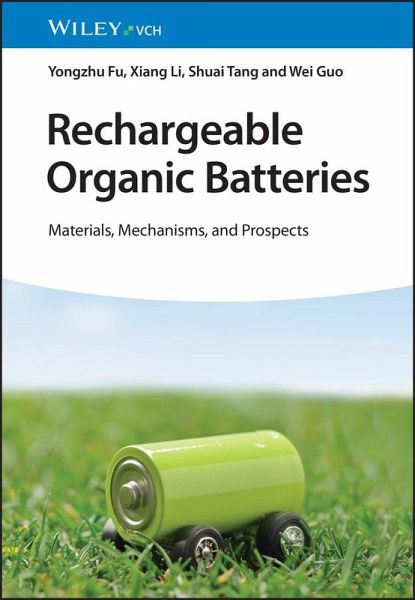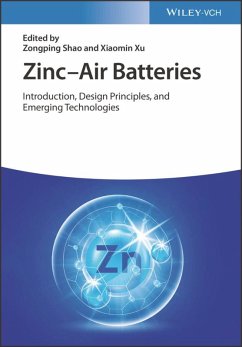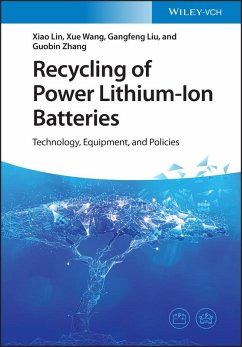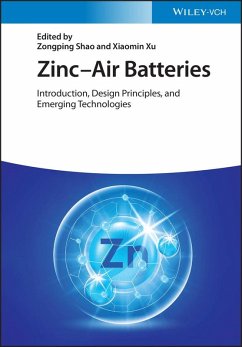
Rechargeable Organic Batteries (eBook, PDF)
Materials, Mechanisms, and Prospects
Versandkostenfrei!
Sofort per Download lieferbar
124,99 €
inkl. MwSt.
Weitere Ausgaben:

PAYBACK Punkte
0 °P sammeln!
A must-have reference on sustainable organic energy storage systemsOrganic electrode materials have the potential to overcome the intrinsic limitations of transition metal oxides as cathodes in rechargeable batteries. As promising alternatives to metal-based batteries, organic batteries are renewable, low-cost, and would enable a greener rechargeable world.Rechargeable Organic Batteries is an up-to-date reference and guide to the next generation of sustainable organic electrodes. Focused exclusively on organic electrode materials for rechargeable batteries, this unique volume provides comprehe...
A must-have reference on sustainable organic energy storage systems
Organic electrode materials have the potential to overcome the intrinsic limitations of transition metal oxides as cathodes in rechargeable batteries. As promising alternatives to metal-based batteries, organic batteries are renewable, low-cost, and would enable a greener rechargeable world.
Rechargeable Organic Batteries is an up-to-date reference and guide to the next generation of sustainable organic electrodes. Focused exclusively on organic electrode materials for rechargeable batteries, this unique volume provides comprehensive coverage of the structures, advantages, properties, reaction mechanisms, and performance of various types of organic cathodes.
In-depth chapters examine carbonyl-, organosulfur-, radical-, and organometallic complexes, as well as polymer-based active materials for electrochemical energy storage (EES) technologies. Throughout the book, possible application cases and potential challenges are discussed in detail.
Featuring a general introduction to organic batteries, including a discussion of their necessity and advantages, Rechargeable Organic Batteries is essential reading for electrochemists, materials scientists, organic chemists, physical chemists, and solid-state chemists working in the field.
Organic electrode materials have the potential to overcome the intrinsic limitations of transition metal oxides as cathodes in rechargeable batteries. As promising alternatives to metal-based batteries, organic batteries are renewable, low-cost, and would enable a greener rechargeable world.
Rechargeable Organic Batteries is an up-to-date reference and guide to the next generation of sustainable organic electrodes. Focused exclusively on organic electrode materials for rechargeable batteries, this unique volume provides comprehensive coverage of the structures, advantages, properties, reaction mechanisms, and performance of various types of organic cathodes.
In-depth chapters examine carbonyl-, organosulfur-, radical-, and organometallic complexes, as well as polymer-based active materials for electrochemical energy storage (EES) technologies. Throughout the book, possible application cases and potential challenges are discussed in detail.
- Presents advanced characterization methods for verifying redox mechanisms of organic materials
- Examines recent advances in carbonyl-based small-molecule cathode materials in battery systems including lithium-ion, sodium-ion, and aqueous zinc-ion batteries
- Introduces organosulfide-inorganic composite cathodes with high electrical conductivity and fast reaction kinetics
- Outlines research progress on radical electrode materials, polymer-based organic cathode materials, and the development of all-organic batteries
- Summarizes the synthesis processes, redox mechanisms, and electrochemical performance of different kinds of organic anode materials for metal-ion batteries
Featuring a general introduction to organic batteries, including a discussion of their necessity and advantages, Rechargeable Organic Batteries is essential reading for electrochemists, materials scientists, organic chemists, physical chemists, and solid-state chemists working in the field.
Dieser Download kann aus rechtlichen Gründen nur mit Rechnungsadresse in D ausgeliefert werden.













